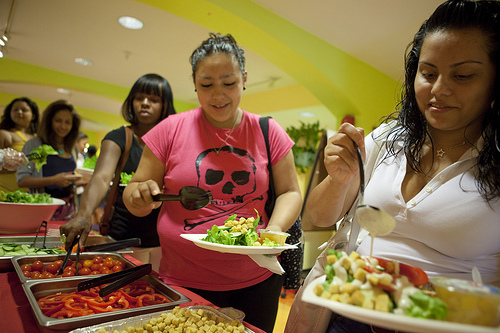In response to public outcry and several “brown bag-ins” in schools across the country, the U.S. Department of Agriculture loosened new meat and grain restrictions on school lunches in December. Two Republicans have introduced separate bills that would give the meal changes some teeth.
Rep. Kristi Noem (R-SD) introduced a school nutrition bill in December that would reduce federal school lunch mandates. Rep. Rodney Davis (R-IL) put forth legislation to require the White House and U.S. Department of Agriculture (USDA) to abide by the same nutritional standards they impose on U.S. students.
“While state dinners can serve up thousands of calories for a single meal, one million fewer kids were participating in the National School Lunch program because of these onerous regulations,” said Davis spokesman Andrew Flach.
Federal Food Cop
In 2010, Congress passed the Healthy, Hunger-Free Kids Act, championed by Michelle Obama. It forced schools to adhere to new lunch regulations beginning in the 2012-13. The new rules included set calorie ranges and weekly limits on grain and meat consumption.
“For decades, ‘public health’ advocates have been pressuring Congress to increase regulations on school nutrition programs,” said Terry Stoops, director of education studies at the John Locke Foundation. “They found a friend in the Obama administration, particularly First Lady Michelle Obama, whose ‘Let’s Move’ initiative is focused on reducing childhood obesity through the nanny state.”
They also limited schools to serving about 2 ounces of meat in each meal. Similar limits were put on grains, and new restrictions were added regarding fruits, vegetables, and milk.
“Parents, students, and school administrators alike have reached out to me with serious concerns,” Noem said.
Waste Not
Noem’s bill would make permanent the USDA’s easing of meat and grain requirements and give flexibility on some of the rules that have proved expensive for local districts.
“As with most issues that involve our kids,” Noem said, “decisions about school lunches should be made as close to home as possible.”
The food rules require all children to take all parts of the meal offered. This has led to food waste, said a recent Government Accountability Office report.
“Public school children … dislike the food and refuse to eat it,” said Stoops. “This would appear to defeat the purpose of a program designed to feed children.”
‘Progressivism Run Amok’
Davis’ bill is a response to constituents who “felt like the administration wasn’t listening to them,” Flach said.
“This is about overly prescriptive regulations coming down from Washington that were leading to wasted food, lost revenue, higher costs, reduced participation, and in some cases, hungry kids,” he said.
“It is the same, old story of progressivism run amok,” Stoop explained. “These ‘fooducrats’ do not believe that families and local communities have the capacity to make rational decisions about nutrition and exercise. So, they use billions in taxpayer money to bribe schools to adhere to their mandates and declare it to be successful before the first school lunch is served.”
Image by USDA.





